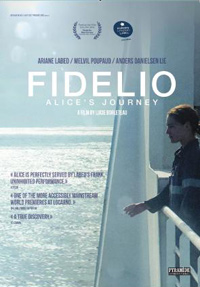Go Ask Alice: Borleteau’s Debut Examines Desire, Gender, and Maturity
 Sure to be described as “European,” seemingly in the sense that it relays a familiar dynamic and predicament generally seen from a male perspective in English language cinema, actress turned director Lucie Borleteau makes an astute debut with Fidelio: Alice’s Journey. An exciting international coproduction featuring well known Greek, Norwegian and French actors, Borleteau creates an impressive character arc for its lead protagonist while sidestepping clichés of a woman navigating male spheres at almost every turn as it examines, with refreshing frankness, realities of desire vs. the eponymous notion for which it’s named.
Sure to be described as “European,” seemingly in the sense that it relays a familiar dynamic and predicament generally seen from a male perspective in English language cinema, actress turned director Lucie Borleteau makes an astute debut with Fidelio: Alice’s Journey. An exciting international coproduction featuring well known Greek, Norwegian and French actors, Borleteau creates an impressive character arc for its lead protagonist while sidestepping clichés of a woman navigating male spheres at almost every turn as it examines, with refreshing frankness, realities of desire vs. the eponymous notion for which it’s named.
Replacing an engineer that’s mysteriously died on the vessel Fidelio, sailor Alice (Ariane Labed) leaves behind her intense new relationship with Felix (Anders Danielson Lie). Once aboard, she discovers that Gael (Melville Poupaud) is the captain, a man she had a torrid affair with years before on the same vessel when he was an engineer and she was a cadet. Their attraction is evident and picks up where it left off years prior, which seems to excite Alice because she has man both at home and at sea. But her actions have consequences, as she soon discovers.
Labed, whose first film was 2010’s Attenberg, for which she won Best Actress in Venice, adds another award to her filmography as Alice, for which she won at Locarno last year. Borleteau avoids making any definitive feminist ideals with Alice entrenched in this otherwise homosocial space, instead crafting a narrative simply attenuated to the effervescence of its title character. We’ve seen plenty of films hinged on the shoulders of a lone woman finding her way, against all odds, in male dominated occupations, but Borleteau’s is a unique example, for this is exactly what gives Alice her source of power. Initially, an early unwanted transgression which displaces the ship’s chief would have us believe the film will revolve around gendered workplace politics, but this isn’t the case. Instead, it only serves to highlight the importance of context and how no matter of political correctness can sanitize our daily lives into easily drawn white and black categories.
Mostly, the film revolves around the fantasy (and subsequent bonding) that accompanies occupations such as the one depicted here. Alice’s predicament isn’t unique, after all, as another crew member relays his recent divorce, while Alice peruses the diary of the mysteriously dead engineer she had been hired to replace and finds herself reexamining her own actions and goals as she taps into the deceased man’s life. Small details succinctly give us a handle on Alice’s thought processes, revisiting an initial romantic flame on a vessel that used to be called Eclipse, now renamed Fidelio, as if these were actual chapters in her own bildungsroman. But Alice is immediately transported back to the feelings she originally felt for the engineer turned captain, a feeling evident in how she longingly moons over the tape she finds over a faulty pipe she had placed years before.
Poupaud, in his most significant role since Laurence Anyways, is a likeable distraction, and intimately lusty encounters are frequent yet tastefully depicted. But his violation of the understanding of “what happens at sea stays at sea” forces a reexamination of her landlocked romance with Lie’s third part of the triangle, here a likeable presence but hardly given the chance to shine as he does in two excellent films from Joachim Trier. But from Alice’s point of view, this is an intricate and impressive maturation of learning how to understand what’s meaningful and worthy of pursuit. An interesting American counterpoint would be the Vera Farmiga character in Up in the Air, hardly as fully realized and used as a ‘big twist,’ Borleteau’s wisdom asserts that actualization occurs when we’re allowed to examine or work through the desires that chain us to false ideas of our nostalgia tinged pasts rather than the abject repression of them. Which may explain why it has yet to receive US distribution.
Reviewed on January 3 at the 2015 Palm Springs International Film Festival. 97 Mins.
★★★½/☆☆☆☆☆


